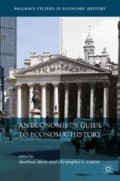Abstract
There has been no progress in the modest interest in economic history in the top five economics journals since the 1970s. This is despite an apparent newfound enthusiasm for the field among economists. This chapter explains this contradiction by highlighting the differences between research in economic history and economics that exploits historical data. In so doing, the author defines what, in his view, constitutes good economic history research.
Access this chapter
Tax calculation will be finalised at checkout
Purchases are for personal use only
Notes
- 1.
A related exercise carried out by Ran Abramitzky (2015) for the “top three” economics journals finds an increase in economic history representation over time. Abramitzky’s result appear to be driven by contributions to just one journal: The Quarterly Journal of Economics. Taken together with my own results, this suggests that while the total quantity of economic history appearing in top general interest journals has remained constant over time, there has been a shift in interest between the editors of these top journals.
- 2.
These examples would include the World Top Income Database, the Global Price and Income History Group, the Maddison Project, the Jordà-Schularick-Taylor Macrohistory Database and the Measuring Worth Project.
Reading List
Abramitzky, Ran. 2015. Economics and the Modern Economic Historian. The Journal of Economic History 75 (4): 1240–1251.
Acemoglu, Daron, Simon Johnson, and James A. Robinson. 2001. The Colonial Origins of Comparative Development: An Empirical Investigation. American Economic Review 91 (5): 1369–1401.
Akerlof, George. 1970. The Market for Lemons. Quarterly Journal of Economics 84 (3): 488–500.
Albouy, David Y. 2012. The Colonial Origins of Comparative Development: An Empirical Investigation: Comment. American Economic Review 102 (6): 3059–3076.
Altman, Morris. 2003. Staple Theory and Exportled Growth: Constructing Differential Growth. Australian Economic History Review 43 (3): 230–255.
Arsenault Morin, Alex, Vincent Geloso, and Vadim Kufenko. 2017. The Heights of French-Canadian Convicts, 1780s–1820s. Economics & Human Biology 26: 126–136.
Bolt, Jutta, Robert Inklaar, Herman de Jong, and Jan Luiten van Zanden. 2018. Rebasing ‘Maddison’: New Income Comparisons and the Shape of Long-run Economic Development. Groningen Growth and Development Centre Research Memorandum, Paper No. 174.
Bond, Eric W. 1982. A Direct Test of the Lemons’ Model: The Market for Used Pickup Trucks. American Economic Review 72 (4): 836–840.
Broadberry, Stephen, Johann Custodis, and Bishnupriya Gupta. 2015. India and the Great Divergence: An Anglo-Indian Comparison of GDP per Capita, 1600–1871. Explorations in Economic History 55: 58–75.
Card, David, and Stefano Della Vigna. 2013. Nine Facts about Top Journals in Economics. Journal of Economic Literature 51 (1): 144–161.
Cranfield, John, and Kris Inwood. 2007. The Great Transformation: A Long-run Perspective on Physical Well-being in Canada. Economics & Human Biology 5 (2): 204–228.
de Figueiredo, Rui J.P., Jr., Jack Rakove, and Barry R. Weingast. 2006. Rationality, Inaccurate Mental Models, and Self-confirming Equilibrium: A New Understanding of the American Revolution. Journal of Theoretical Politics 18 (4): 384–415.
de Vries, Jan. 2017. Changing the Narrative: The New History That was and is to Come. Journal of Interdisciplinary History 48 (3): 313–334.
Geloso, Vincent. 2018. British Public Debt, the Acadian Expulsion and the American Revolution. In Public Choice Analyses of American Economic History, ed. J. Hall and M. Witcher. Cham: Springer.
———. forthcoming. Measuring Away the Importance of Institutions: The Case of Seigneurial Tenure and Agricultural Output in Canada East, 1851. Social Science Quarterly.
Geloso, Vincent, Michael Hinton, and Vadim Kufenko. 2017. The Equally “Bad” French and English Farmers of Quebec: New TFP Measures from the 1831 Census. Historical Methods: A Journal of Quantitative and Interdisciplinary History 50 (3): 170–189.
Geloso, Vincent, and Alexis Lacombe. 2016. Why was Flour of Poor Quality? The Impact of Seigneurial Laws and Price Controls on Flour in Quebec during the Colonial Era. Agricultural History Review 64 (2): 181–195.
Greene, Jack P. 2000. The American Revolution. American Historical Review 105 (1): 93–102.
Jerven, Morten. 2013. Poor Numbers: How We are Misled by African Development Statistics and What to Do About It. Ithaca, NY: Cornell University Press.
Lindert, Peter H., and Jeffery G. Williamson. 2016. Unequal Gains: American Growth and Inequality Since 1700. Princeton, NJ: Princeton University Press.
McInnis, R. 1981. Some Pitfalls in the 1851–1852 Census of Agriculture of Lower Canada. Histoire Sociale/Social History 14 (27): 219–231.
von Mises, Ludwig. (1957) 2006. Theory and History: An Interpretation of Social and Economic Evolution. Liberty Fund.
Ouellet, Fernand. 1980. Lower Canada 1791–1840: Social Change & Nationalism. Toronto: McClelland & Stewart.
Rabushka, Alvin. 2010. Taxation in Colonial America. Princeton, NJ: Princeton University Press.
Rakove, Jack., A. Rutten, and B. Weingast 2000. Ideas, Interest, and Credible Commitments in the American Revolution. Working Paper, Hoover Institution, Stanford University.
Author information
Authors and Affiliations
Editor information
Editors and Affiliations
Rights and permissions
Copyright information
© 2018 The Author(s)
About this chapter
Cite this chapter
Geloso, V.J. (2018). Economics, Economic History and Historical Data. In: Blum, M., Colvin, C. (eds) An Economist’s Guide to Economic History. Palgrave Studies in Economic History. Palgrave Macmillan, Cham. https://doi.org/10.1007/978-3-319-96568-0_3
Download citation
DOI: https://doi.org/10.1007/978-3-319-96568-0_3
Published:
Publisher Name: Palgrave Macmillan, Cham
Print ISBN: 978-3-319-96567-3
Online ISBN: 978-3-319-96568-0
eBook Packages: Economics and FinanceEconomics and Finance (R0)

